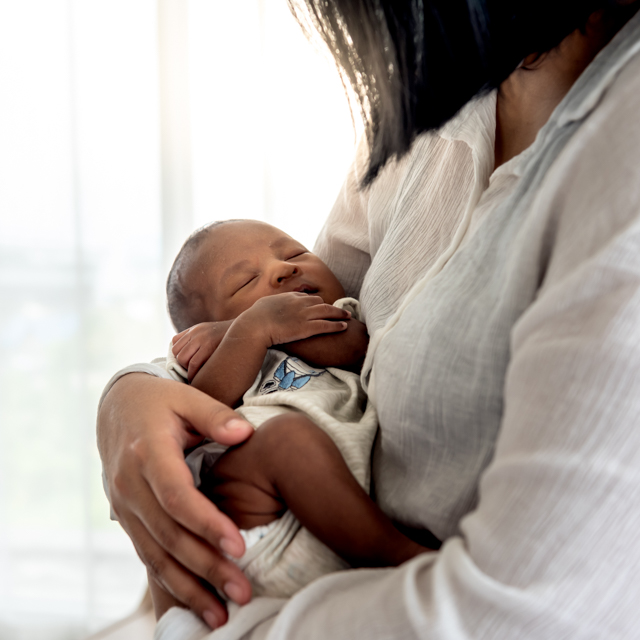The days and weeks after the birth of your baby can be an emotional whirlwind. Learn the difference between stress, “baby blues” and something more serious.
It’s normal for you to not feel quite yourself emotionally after giving birth. Your body and your family have just gone through some major changes. The stresses of life and your hormonal changes can make you feel like you’re on top of the world one minute and like things are crashing down around you the next. But there’s a big difference between postpartum depression and the more common “baby blues.”
“The baby blues can develop about two to three days after giving birth,” said Dr. Anna W. Morad, a pediatrician and director of the Newborn Nursery at Monroe Carell Jr. Children’s Hospital at Vanderbilt. “You might feel sad, on edge, or upset with those around you — even your new baby. You might even question whether you are cut out for motherhood. Rest assured that these feelings are normal and will pass in a few days or a couple weeks.”
This temporary plunge into depression-like symptoms typically gets better without the need for medications or other treatments.
Postpartum depression signs and symptoms
Postpartum depression symptoms develop later, last longer and are more serious. Symptoms can develop one to three weeks after childbirth or at any time throughout the first year. Symptoms last more than just a day or two and often require medication to help.
Postpartum depression is more common if you have a history of depression before pregnancy, but can also be related to stress, hormonal changes, fatigue from a difficult pregnancy or delivery, and a number of emotional factors.
When considering whether you or someone you love has postpartum depression, look for:
- Low energy and disinterest in things you normally enjoy.
- Eating or sleeping more or less than usual.
- Not feeling happy even with happy moments.
- Feeling guilty and blaming yourself even when small things go wrong.
- Feeling anxious and nervous about things out of your control (such as the health of your baby).
- Thoughts of harming yourself or your baby.
“If you think that someone you love is suffering, offer to help,” Morad said. “Make that meal, babysit any older children and offer reassurance. Help her reach out to her OB-GYN provider or the baby’s pediatric provider and find out what resources are near her. These online resources may also be helpful. Postpartum depression is a serious mental health concern that shouldn’t be ignored. Awareness of the signs and symptoms is a good place to start.”
Sometimes, it’s simply stress
Morad shared details of her own experience — with a preterm baby who needed to be in the neonatal intensive care unit — to drive home the point that sometimes, stress is the main culprit.
“When my daughter was in neonatal intensive care unit, I remember being completely unprepared for the emotional challenge of a sick baby,” Morad said. “In my mind, my house was unkempt, my older son neglected, and I was a blubbering mess.”
Meanwhile, her husband and health care team were incredibly supportive.
“Fortunately, our daughter was discharged, and my stress level dropped dramatically when we went home,” Morad said. “It wasn’t until that happened that I realized the source of my stress was mostly circumstantial. It can be hard for the most experienced doctor, midwife or nurse practitioner to tell the difference.”
Morad advised that it comes down to how extreme the symptoms are and how long they persist. Having a support team around you can give you the perspective you need.
“My doctor told my husband if I skipped my shower for a day or so to not worry — but if I skipped for a week then he should call her,” Morad said. “He totally related to that message, and while that was a cheeky way to talk about a serious subject, it points out how exhausting it is to be a new mom and how the village around her keep an eye on her to make sure she is doing well.”

Expert care for you and your baby
Each pregnancy and delivery is unique and yours should be too. Learn more about how Vanderbilt Health’s obstetrics and maternal fetal medicine teams bring together nationally ranked expertise and personalized care from your first prenatal visit to delivery and beyond.
To learn more, call 615-343-5700 or schedule an appointment online.




